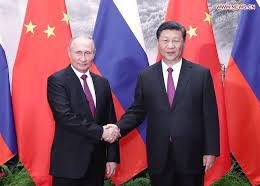By Hassan Osman Kargbo
Russian President Vladimir Putin has described his relationship with Chinese President Xi Jinping as being at an “unprecedented level” as the two leaders met in Beijing on the eve of a massive military parade marking the 80th anniversary of Japan’s surrender in China at the end of World War Two.
The visit underscores the growing partnership between Moscow and Beijing at a time when both nations face heightened tensions with the West. Speaking warmly of Xi, Putin referred to him as a “dear friend,” while Chinese state media hailed the partnership as exemplary, describing it as a model of strategic cooperation.
At the meeting, both sides announced new agreements designed to strengthen political, economic, and social ties. Russia is set to increase supplies of gas to China, expanding an already significant energy partnership that has become more critical since Moscow faced Western sanctions over its war in Ukraine. In return, Beijing said it would introduce a one-year trial program of visa-free travel for Russian citizens, a move widely seen as a gesture to deepen people-to-people exchanges and cultural ties.
The timing of the meeting is particularly symbolic. Xi is preparing to preside over what will be the largest military parade in China’s history, showcasing the country’s growing military strength and nationalist pride. The parade, set for Wednesday in Beijing, will involve tens of thousands of troops, advanced weaponry, and airpower demonstrations in Tiananmen Square. It will commemorate the Chinese victory over Japan in 1945 and highlight China’s narrative of resilience and resurgence.
Xi’s decision to invite both Putin and North Korean leader Kim Jong Un to Beijing is also drawing attention. Kim is expected to attend later this week, signaling a show of solidarity among nations that have found themselves increasingly aligned against Western powers. Analysts say the joint presence of Russia, China, and North Korea at high-profile events signals a strengthening bloc of countries determined to challenge U.S. influence in global affairs.
For Putin, the visit offers another chance to demonstrate that Russia is not diplomatically isolated despite Western attempts to cut Moscow off through sanctions and political pressure. By highlighting his “dear friendship” with Xi and deepening energy and trade ties, Putin is reinforcing Moscow’s pivot to Asia, which has accelerated since the Ukraine war began.
For Xi, the meeting serves multiple purposes. It not only bolsters China’s image as a global power with strong allies but also reinforces Beijing’s stance as a counterbalance to Western alliances such as NATO and the G7. Hosting Putin and soon Kim Jong Un provides a symbolic display of unity with nations that share skepticism of Western-led global order.
Observers note that the gas supply agreements and the visa-free travel program demonstrate the tangible benefits of the partnership, while the military parade is expected to send a clear message of strength and cooperation to the world.
As Beijing prepares to host the grand spectacle, the gathering of these leaders highlights shifting global dynamics. With Moscow deepening its reliance on Beijing and China positioning itself as a leader of alternative alliances, the partnership between Putin and Xi appears set to shape international relations well beyond the anniversary celebrations.











